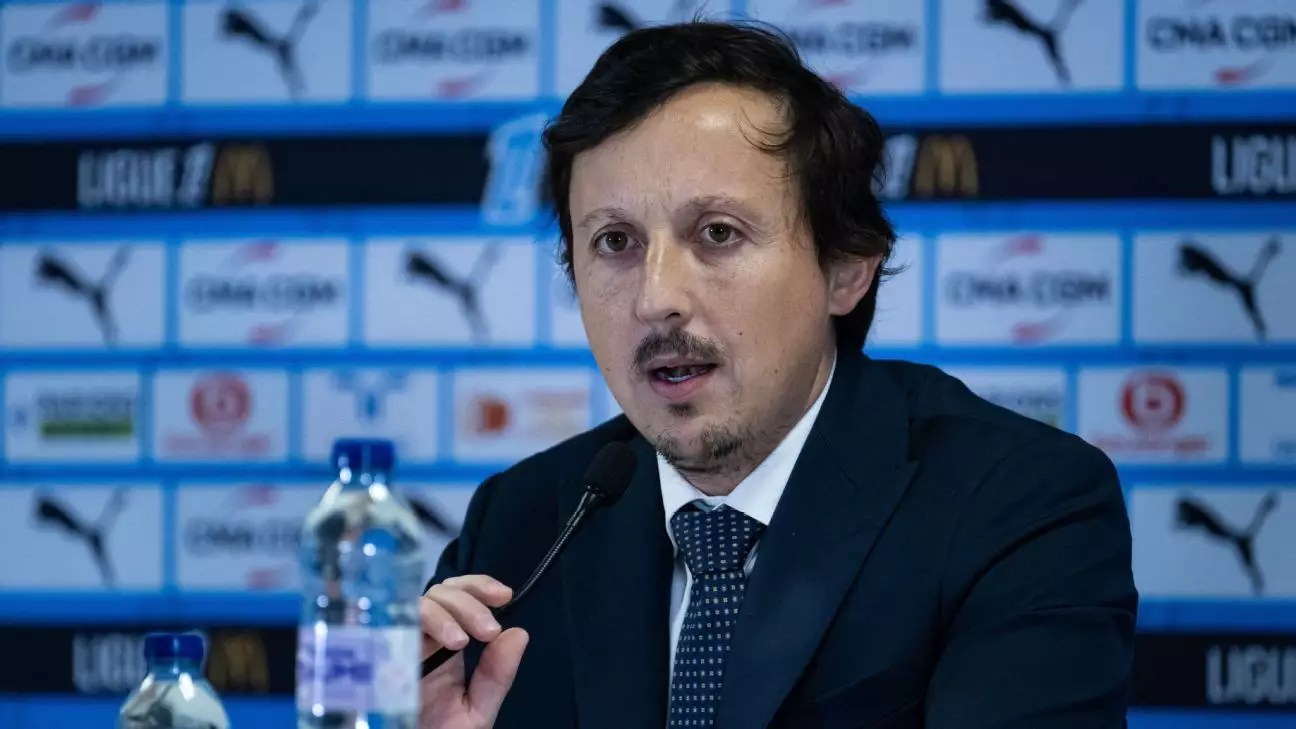The recent escalation of accusations against referees in Ligue 1 has sparked a considerable reaction from both the French Football Federation (FFF) and the referees’ union, following a heated tirade from Marseille’s president, Pablo Longoria. His claims of “true corruption” and insinuations of organized misconduct by referees have not only reignited discussions about officiating in French football but have also led to a stiff backlash from the sporting community. In the backdrop of this controversy lies a backdrop of immense pressure as the Ligue 1 season unfolds, with Paris Saint-Germain (PSG) dominating the league standings.
Following a frustrating 3-0 defeat at Auxerre, Longoria’s bitter remarks came as a culmination of a series of disappointments for Marseille. The loss marked their fifth in the league, pushing them further from PSG, who continues to pull away with a commanding lead. Longoria’s statement that there exists a “plot” against Marseille reflects not only his intense frustration over the team’s performance but points to the broader struggles within the club to find consistency. This line of accusation is not new for Marseille, but the sharpness of Longoria’s comments raises questions about the mental state of the club amid a challenging season.
His vehement outburst suggests that Longoria perceives a systemic issue with refereeing in the league. Coupled with Marseille’s struggles on the pitch, such public accusations can have implications beyond a single match—potentially influencing fans’ and players’ perceptions of fairness within the competition. However, such grave allegations demand a robust basis of evidence; otherwise, they risk undermining the integrity of the league.
In response to these incendiary remarks, Philippe Diallo, the FFF president, swiftly condemned Longoria’s accusations, emphasizing the importance of protecting the integrity of referees. Diallo’s firm statement pointed to the “defamatory and unacceptable” nature of Longoria’s comments, highlighting the delicate balance between maintaining transparency and honoring the professionalism of referees. By expressing full support for referee Jérémy Stinat, Diallo illustrated a commitment to upholding the dignity of officials in the face of adversity.
The referee’s union, SAFE, has signaled that they are prepared to take action against what they perceive as unchecked hostility directed at match officials. Their commitment to pursue legal avenues for defamation sends a clear message: any attack on referees will not be tolerated, and there are consequences for actions that may incite violence or foster hate. This response is crucial in preserving the sanctity of the game and ensuring officials can perform their duties without fear of retribution.
The fallout from Longoria’s comments has rippled through the Marseille camp, with coach Roberto De Zerbi and former player Fabrizio Ravanelli also expressing dissatisfaction with the officiating. De Zerbi described the dismissal of player Derek Cornelius as “scandalous,” positing that past controversies may have clouded the referee’s judgment. Such viewpoints further embolden the narrative that decision-making during matches is subject to bias or prior influences.
This commentary from prominent figures raises concerns about the officiating process itself. If players and coaching staff believe that past incidents shape referee decisions, it generates a cycle of distrust that could tarnish the integrity of match outcomes. The scrutiny on Stinat’s performance and decisions in the match against Auxerre adds to the pressure on referees, who are already operating under the spotlight of public and media scrutiny.
The broader implications of these controversies extend well beyond a single club’s frustrations. They illustrate the persistent challenges facing French football and the systems in place to manage disputes regarding officiating. Accusations of corruption chip away at the league’s credibility and can impact fan engagement and perceptions around fairness.
Moreover, as PSG appears increasingly dominant in Ligue 1, the stakes rise even higher for clubs like Marseille striving to regain their competitive edge. Finding solutions to navigate officiating issues without resorting to public accusations will be crucial for the health of the league.
While frustrations from Longoria may resonate with some fans and stakeholders, it is essential for all parties involved in French football to approach these challenges constructively. Maintaining respect for one another, fostering collaboration, and enhancing the standards of officiating in the league are paramount to navigating the path forward without weighing down the beautiful game with unfounded allegations and discord.


Leave a Reply